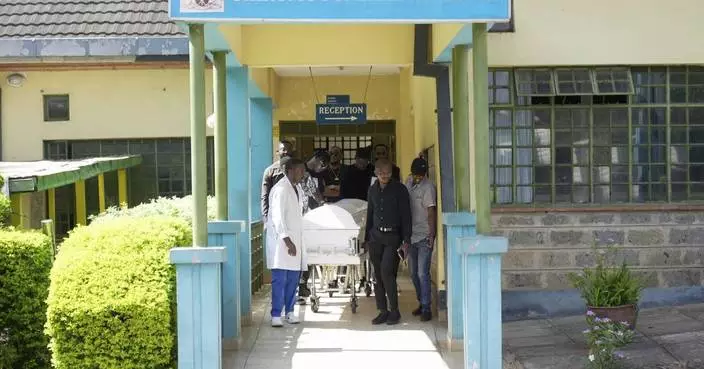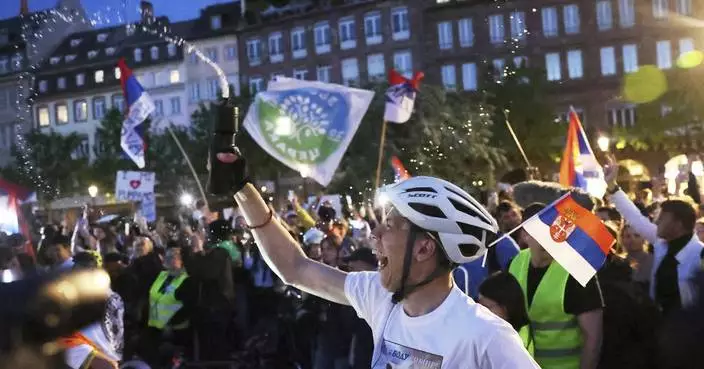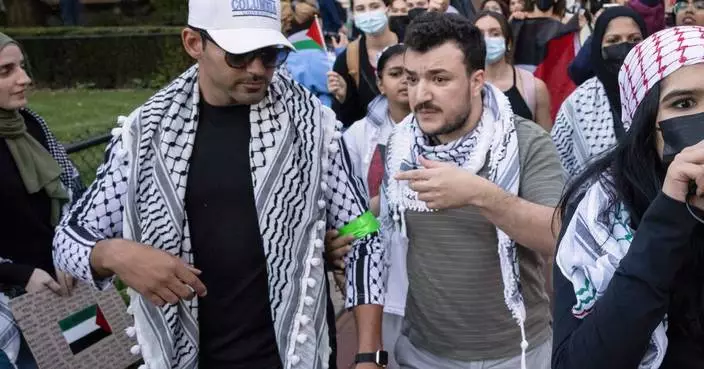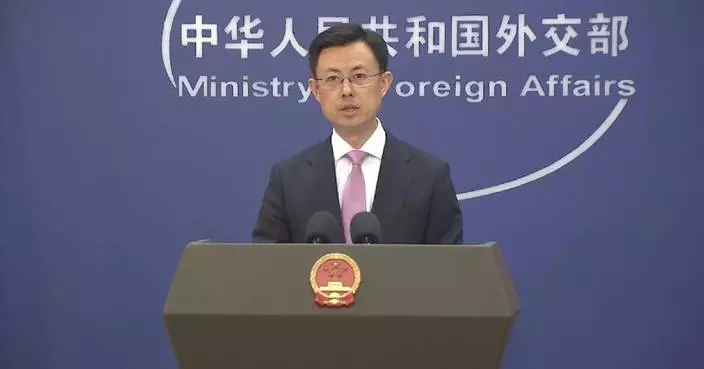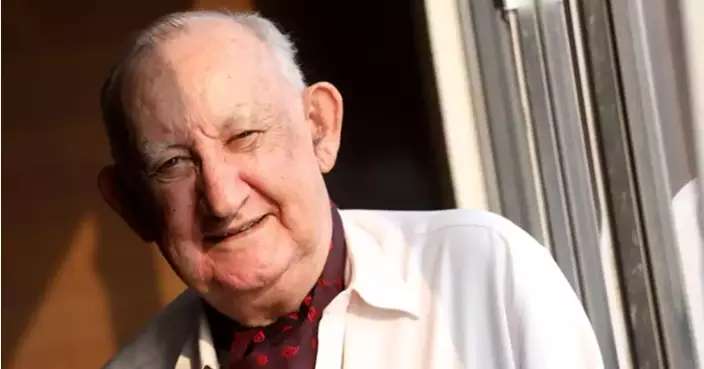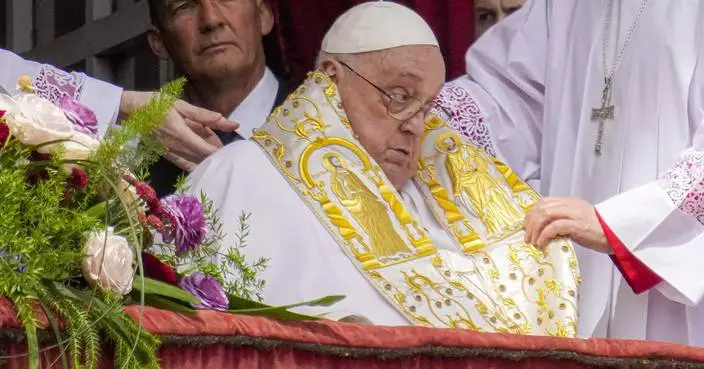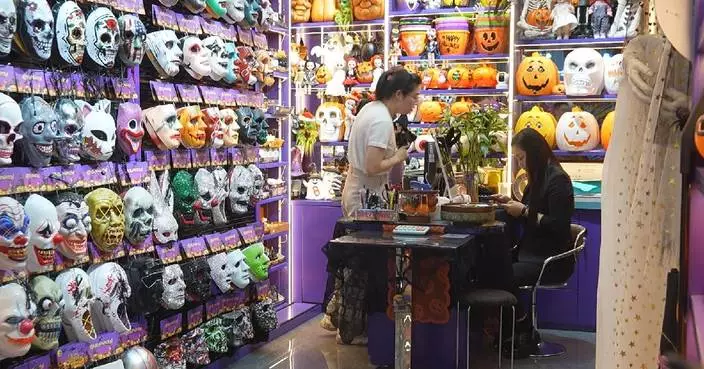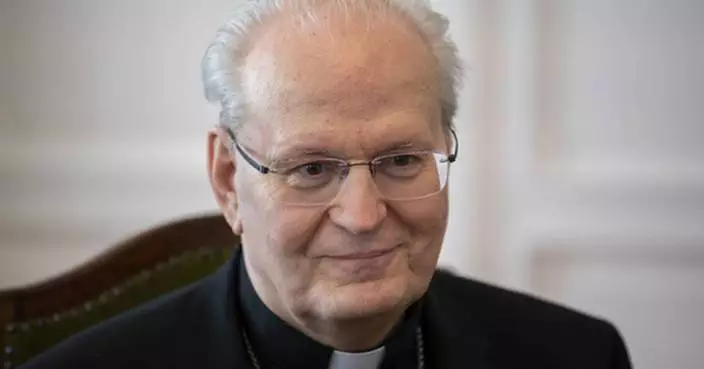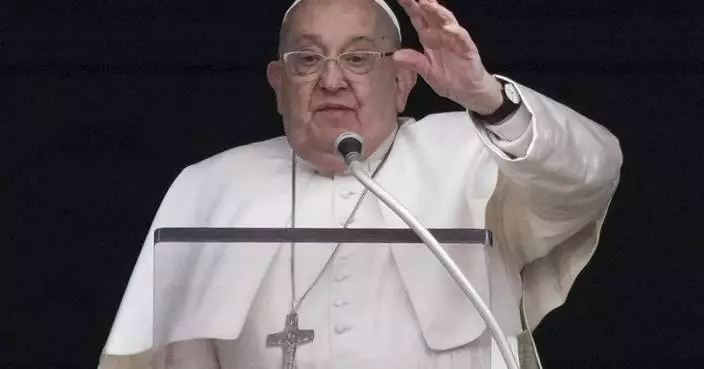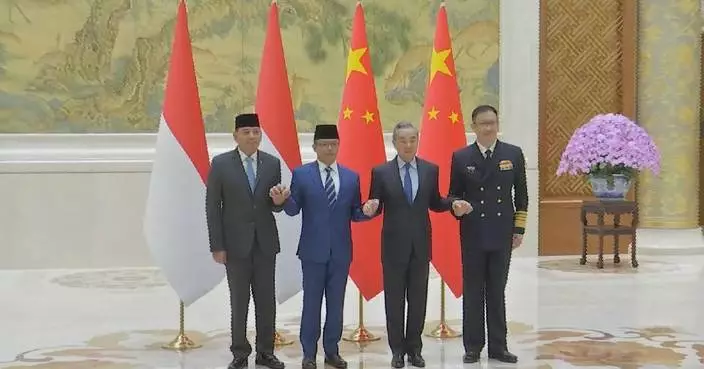President Uhuru Kenyatta on Monday was declared the overwhelming winner of a rerun election boycotted by Kenya's main opposition leader, collecting 98 percent of the vote but also exposing the divisions roiling this East African country.
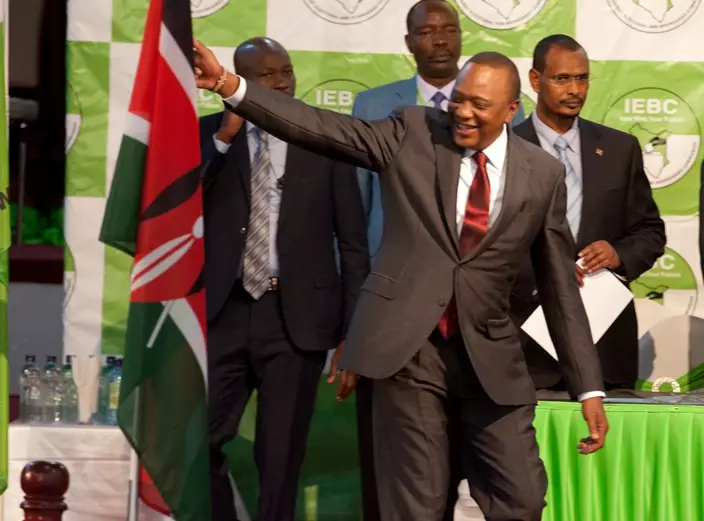
Uhuru Kenyatta, waves to the crowd after he was announced the winner in the rerun of presidential election at the Centre in Bomas, Nairobi, Monday, Oct. 30, 2017. Kenya's election commission says President Uhuru Kenyatta has won election that was boycotted by main opposition group.(AP Photo/ Sayyid Abdul Azim)
While Kenyatta's backers celebrated his re-election, angry supporters of his rival, Raila Odinga, skirmished with police in Nairobi slums and burned tires in Kisumu, one of the opposition strongholds in western Kenya.
Click to Gallery
President Uhuru Kenyatta, right, reacts as the Chairman of the Independence Electoral and Boundaries Commission, Wafula Chebukati, left, declares him the winner in the rerun of presidential race at the Centre in Bomas, Nairobi, Kenya, Monday, Oct.30, 2017. (AP Photo/ Sayyid Abdul Azim)
Uhuru Kenyatta, waves to the crowd after he was announced the winner in the rerun of presidential election at the Centre in Bomas, Nairobi, Monday, Oct. 30, 2017. Kenya's election commission says President Uhuru Kenyatta has won election that was boycotted by main opposition group.(AP Photo/ Sayyid Abdul Azim)
An Kenyan police officer carries a student to safety during clashes between protestors and police in the Kawangware suburb of Nairobi, Kenya, on Monday, Oct. 30, 2017. Sporadic violence has erupted in Kenya since a presidential election last week and opposition leader Raila Odinga boycotted the vote. (AP Photo/Will Swanson)
A man holds his hands in the air, left, as riot police dismantle a barricade during clashes with opposition protesters after the election result was announced, in the Mathare slum of Nairobi, Kenya Monday, Oct. 30, 2017. (AP Photo/Ben Curtis)
Residents demonstrate as they burn tires in the street after the election result was announced, in Kisumu, Kenya, Monday, Oct. 30, 2017. (AP Photo)
Passers by run for safety during clashes between opposition supporters and police which erupted after the election commission announced results from the Oct. 26 vote, in the Kibera area of Nairobi, Kenya, Monday, Oct. 30, 2017. (AP Photo/Darko Bandic)
Passers by run for safety during clashes between opposition supporters and police which erupted after the election commission announced results from the Oct. 26 vote, in the Kibera area of Nairobi, Kenya, Monday, Oct. 30, 2017. (AP Photo/Darko Bandic)
School students run for safety between police and protestors during clashes between protestors and police in the Kawangware suburb of Nairobi, Kenya, on Monday, Oct. 30, 2017. Sporadic violence has occurred in Kenya since a presidential election last week and opposition leader Raila Odinga boycotted the vote.(AP Photo/Will Swanson)
A man holds his hands in the air as he runs past a barricade towards riot police during clashes between opposition protesters and police after the election result was announced, in the Mathare area of Nairobi, Kenya, Monday, Oct. 30, 2017. (AP Photo/Ben Curtis)
Supporters of Kenyan President Uhuru Kenyatta's holding flags and posters as they celebrate in Nairobi, Kenya, Monday Oct. 30, 2017, after Uhuru and his running mate William Ruto were declared winners of rerun presidential elections.(AP Photo/John Muchucha)
Supporters of Kenyan President Uhuru Kenyatta's holding his poster and flags as they celebrate in Nairobi, Kenya, Monday Oct. 30, 2017, after Uhuru and his running mate William Ruto were declared winners of rerun presidential elections.(AP Photo/Johm Muchucha)
An opposition supporter injured during clashes with police which erupted after the election commission announced results from the Oct. 26 vote is carried away, in the Kibera area of Nairobi, Kenya, Monday, Oct. 30, 2017. (AP Photo/Darko Bandic)
President Uhuru Kenyatta, right, reacts as the Chairman of the Independence Electoral and Boundaries Commission, Wafula Chebukati, left, declares him the winner in the rerun of presidential race at the Centre in Bomas, Nairobi, Kenya, Monday, Oct.30, 2017. (AP Photo/ Sayyid Abdul Azim)
An opposition protester walks past a burning barricade during clashes with police after the election result was announced, in the Mathare area of Nairobi, Kenya, Monday, Oct. 30, 2017. (AP Photo/Ben Curtis)
Residents of Kisumu in Western Kenya demonstrate as they light tyres in the streets to show their displeasure with the declaration of Uhuru Kenyatta as the president following the repeat elections held on October 26. Opposition supporters largely boycotted the voting exercise after opposition leader called it a "Sham".(AP Photo)
An opposition protester mans a burning barricade during clashes with police after the election result was announced, in the Mathare slum of Nairobi, Kenya Monday, Oct. 30, 2017. (AP Photo/Ben Curtis)
Passers by run for safety during clashes between opposition supporters and police which erupted after the election commission announced results from the Oct. 26 vote, in the Kibera area of Nairobi, Kenya, Monday, Oct. 30, 2017.(AP Photo/Darko Bandic)
An opposition protester throws a stick as he tries to attack a man fleeing by motorcycle taxi, as clashes erupted between protesters and police after the election result was announced, in the Mathare slum of Nairobi, Kenya Monday, Oct. 30, 2017. (AP Photo/Ben Curtis)
Uhuru Kenyatta, left, and William Ruto, right chat after they were announced the winners in the rerun of presidential race at the Centre in Bomas, Nairobi, Kenya, Monday, Oct. 30, 2017. The commission said Kenyatta won election with 98.2 percent of the votes (AP Photo/ Sayyid Abdul Azim)
A passer by runs for safety during clashes between opposition supporters and police which erupted after the election commission announced results from the Oct. 26 vote, in the Kibera area of Nairobi, Kenya, Monday, Oct. 30, 2017. (AP Photo/Darko Bandic)
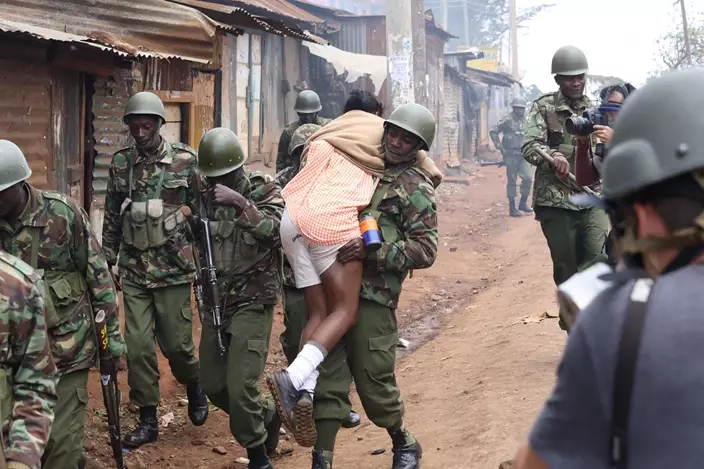
An Kenyan police officer carries a student to safety during clashes between protestors and police in the Kawangware suburb of Nairobi, Kenya, on Monday, Oct. 30, 2017. Sporadic violence has erupted in Kenya since a presidential election last week and opposition leader Raila Odinga boycotted the vote. (AP Photo/Will Swanson)
Kenya's election commission said the turnout of registered voters in the Oct. 26 election was about 40 percent, compared with roughly twice that in August balloting that was nullified by the Supreme Court because of what it called "irregularities and illegalities."
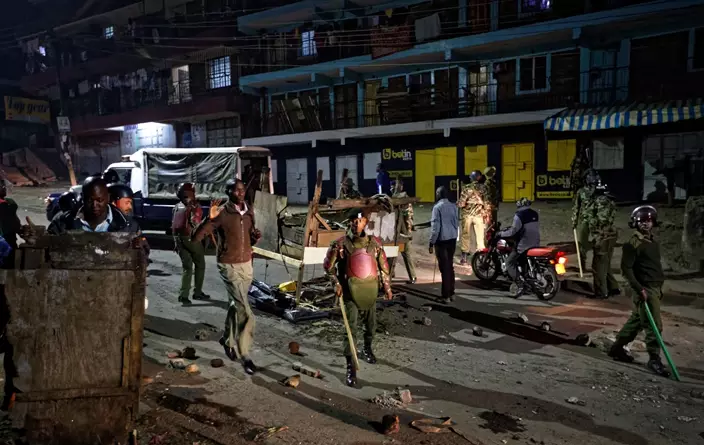
A man holds his hands in the air, left, as riot police dismantle a barricade during clashes with opposition protesters after the election result was announced, in the Mathare slum of Nairobi, Kenya Monday, Oct. 30, 2017. (AP Photo/Ben Curtis)
The rerun was marred by deadly clashes between police and Odinga supporters in the days that followed.
Kenyatta said he expected Odinga followers to mount new legal challenges, indicating the long saga that has left many Kenyans weary of conflict and has hurt business in East Africa's economic hub is not over.
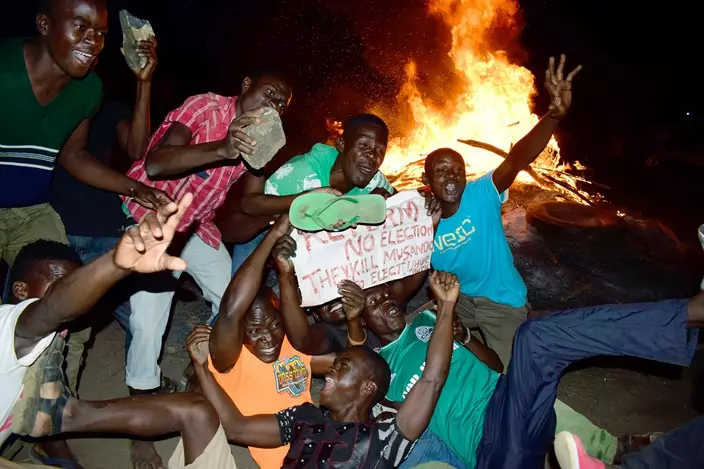
Residents demonstrate as they burn tires in the street after the election result was announced, in Kisumu, Kenya, Monday, Oct. 30, 2017. (AP Photo)
"My victory today was just part of a process that is likely to once again be subjected to a constitutional test through our courts," Kenyatta said at the election commission headquarters after results were announced that gave him a second term. "I will submit to this constitutional path."
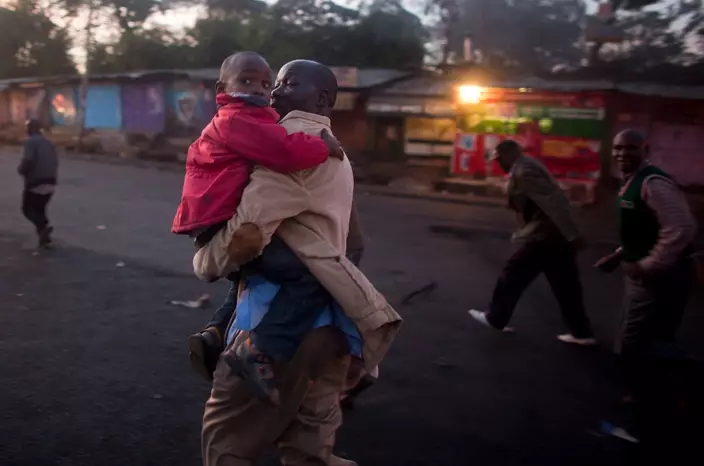
Passers by run for safety during clashes between opposition supporters and police which erupted after the election commission announced results from the Oct. 26 vote, in the Kibera area of Nairobi, Kenya, Monday, Oct. 30, 2017. (AP Photo/Darko Bandic)
Kenyatta said he would consider dialogue with the opposition after the outcome of any court proceedings. He also described his victory as a validation of his win in August, saying the 7.5 million votes that he received this time amounted to 90 percent of what he got earlier.
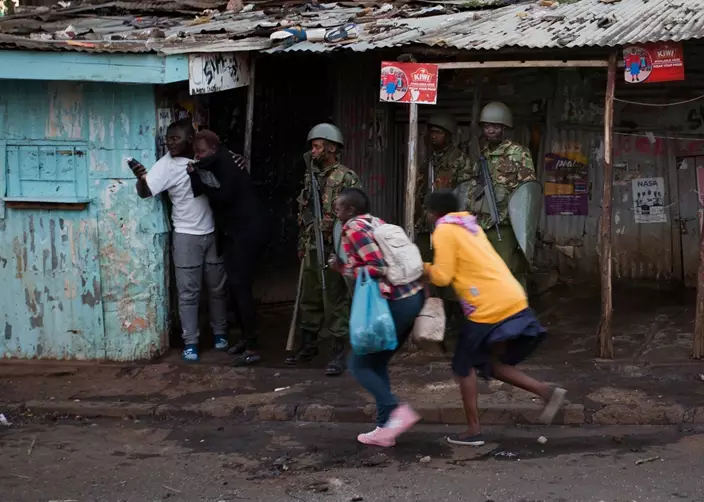
Passers by run for safety during clashes between opposition supporters and police which erupted after the election commission announced results from the Oct. 26 vote, in the Kibera area of Nairobi, Kenya, Monday, Oct. 30, 2017. (AP Photo/Darko Bandic)
Odinga, who dismissed the repeat election as a sham and told his supporters not to participate, remained on the ballot and still got 73,000 votes, or just under 1 percent. In August, he received 45 percent to Kenyatta's 54 percent.
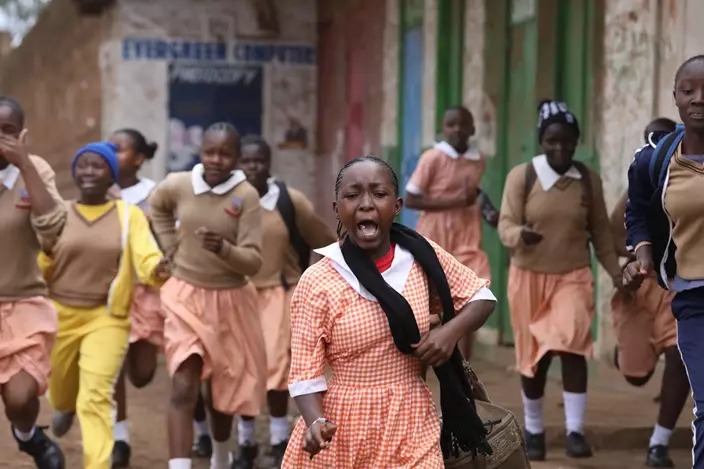
School students run for safety between police and protestors during clashes between protestors and police in the Kawangware suburb of Nairobi, Kenya, on Monday, Oct. 30, 2017. Sporadic violence has occurred in Kenya since a presidential election last week and opposition leader Raila Odinga boycotted the vote.(AP Photo/Will Swanson)
At least nine people have died in violence since the rerun election. Some were shot by police; several died in fighting between Kenya's different ethnic groups, highlighting the loyalties that drive Kenyan politics. Mobs have also looted shops and burned property in some areas.
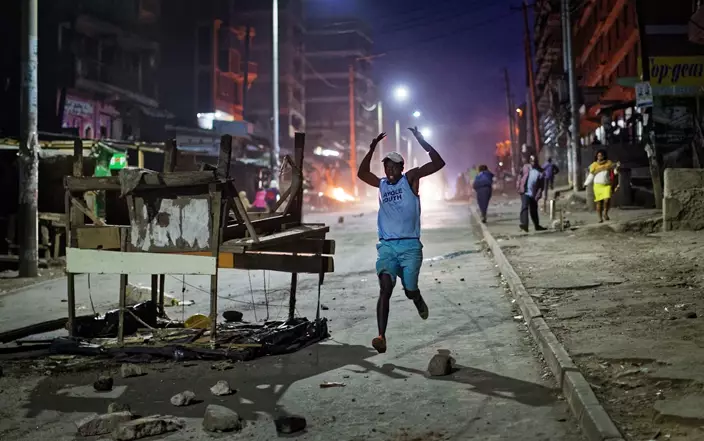
A man holds his hands in the air as he runs past a barricade towards riot police during clashes between opposition protesters and police after the election result was announced, in the Mathare area of Nairobi, Kenya, Monday, Oct. 30, 2017. (AP Photo/Ben Curtis)
Late Monday, crowds in the Nairobi slums of Kibera, Mathare and Kawangware — areas where Odinga has strong support — confronted police, set fires and blocked roads. Security forces used tear gas.
Tires were set ablaze in the western town of Kisumu.
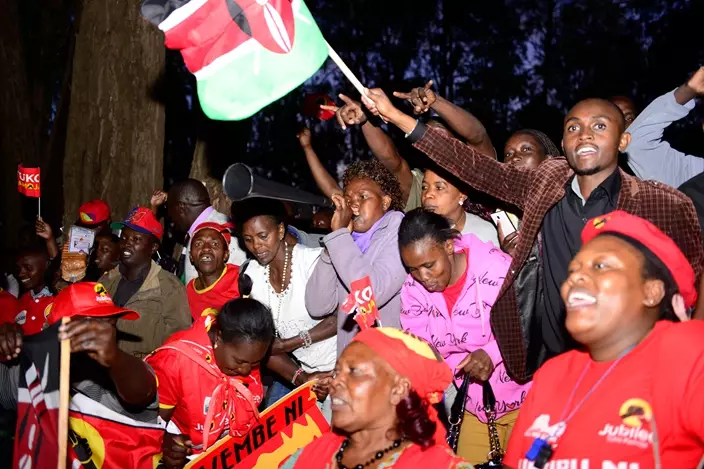
Supporters of Kenyan President Uhuru Kenyatta's holding flags and posters as they celebrate in Nairobi, Kenya, Monday Oct. 30, 2017, after Uhuru and his running mate William Ruto were declared winners of rerun presidential elections.(AP Photo/John Muchucha)
"It was not an election that involved everyone," said Peter Musundi, a Kawangware resident. He called the vote as a "nomination exercise" for the ruling Jubilee party.
Some Kenyatta backers celebrated his victory with song and dance.
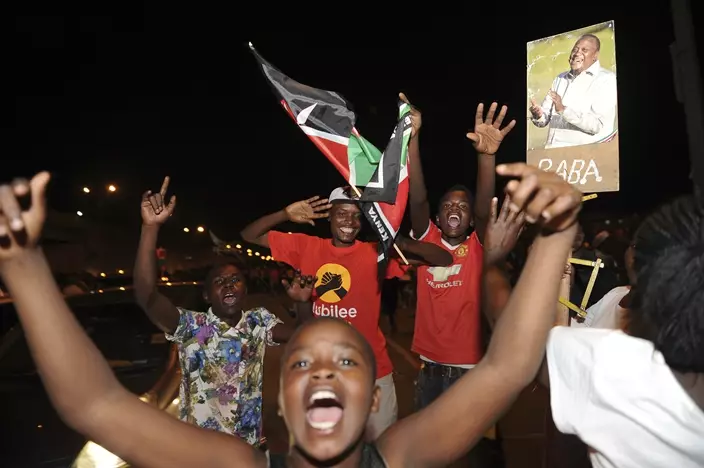
Supporters of Kenyan President Uhuru Kenyatta's holding his poster and flags as they celebrate in Nairobi, Kenya, Monday Oct. 30, 2017, after Uhuru and his running mate William Ruto were declared winners of rerun presidential elections.(AP Photo/Johm Muchucha)
"We wait for Kenya to move forward," said supporter Ann Njoki, speaking near the election commission headquarters.
Voting did not take place in two dozen of Kenya's 290 constituencies due to opposition protests, although the election commission cited an election law that says final results can be announced if the outcome is not affected by the tally in areas that didn't vote.
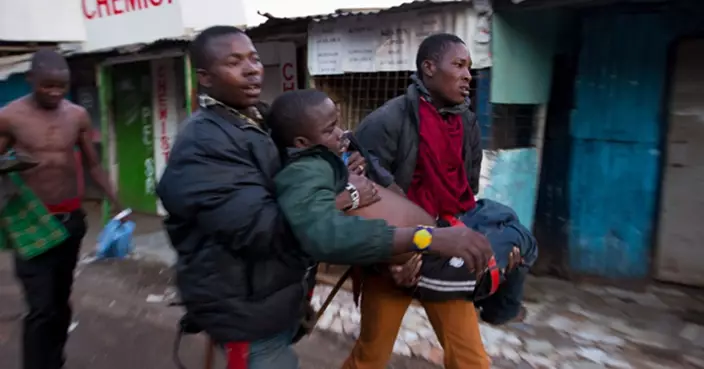
An opposition supporter injured during clashes with police which erupted after the election commission announced results from the Oct. 26 vote is carried away, in the Kibera area of Nairobi, Kenya, Monday, Oct. 30, 2017. (AP Photo/Darko Bandic)
Wafula Chebukati, chairman of the election commission, said before the Oct. 26 vote that he could not guarantee its credibility. Before announcing the results, however, he said he was confident it was a "free, fair and credible election."
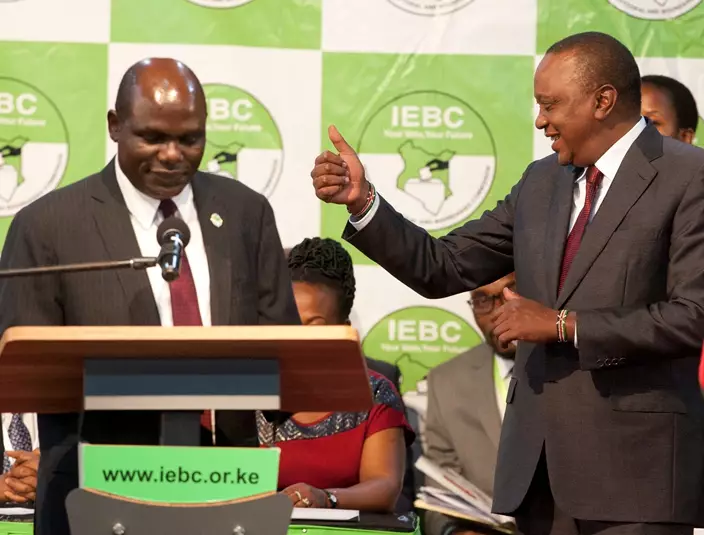
President Uhuru Kenyatta, right, reacts as the Chairman of the Independence Electoral and Boundaries Commission, Wafula Chebukati, left, declares him the winner in the rerun of presidential race at the Centre in Bomas, Nairobi, Kenya, Monday, Oct.30, 2017. (AP Photo/ Sayyid Abdul Azim)
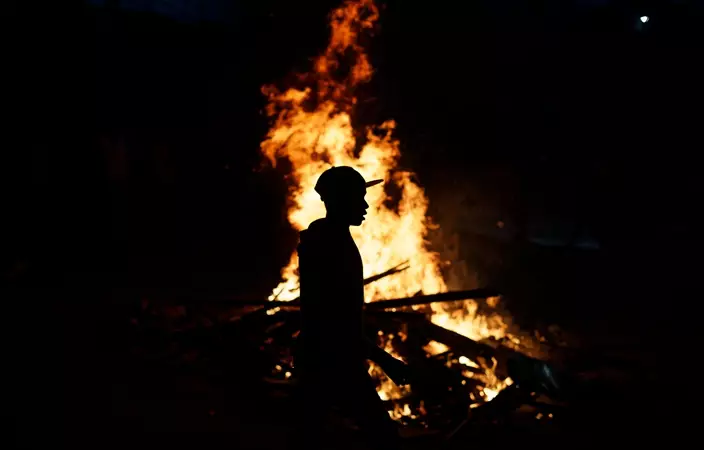
An opposition protester walks past a burning barricade during clashes with police after the election result was announced, in the Mathare area of Nairobi, Kenya, Monday, Oct. 30, 2017. (AP Photo/Ben Curtis)
Odinga has said he will form a "resistance" movement to oppose the government, which has in turn accused opposition leaders of fomenting violence with incendiary rhetoric. He also said he wants another election to be held.
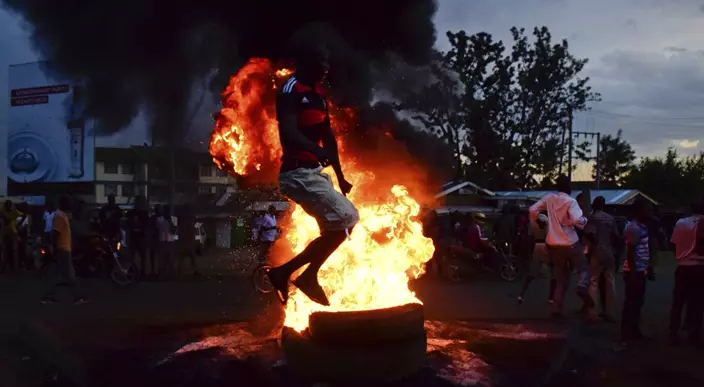
Residents of Kisumu in Western Kenya demonstrate as they light tyres in the streets to show their displeasure with the declaration of Uhuru Kenyatta as the president following the repeat elections held on October 26. Opposition supporters largely boycotted the voting exercise after opposition leader called it a "Sham".(AP Photo)
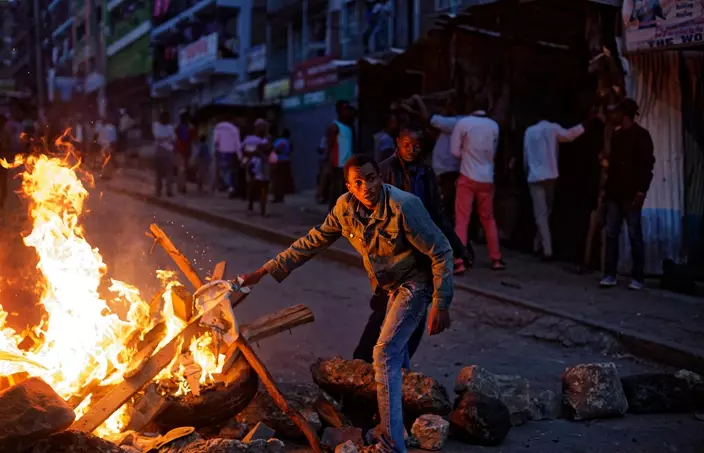
An opposition protester mans a burning barricade during clashes with police after the election result was announced, in the Mathare slum of Nairobi, Kenya Monday, Oct. 30, 2017. (AP Photo/Ben Curtis)
Odinga, who is from the Luo ethnic group, and Kenyatta, who is a Kikuyu, also faced off in a 2013 election similarly marred by allegations of vote-rigging. The opposition leader also ran unsuccessfully in 2007, and ethnic-fueled animosity after that vote killed more than 1,000 people and forced 600,000 from their homes.
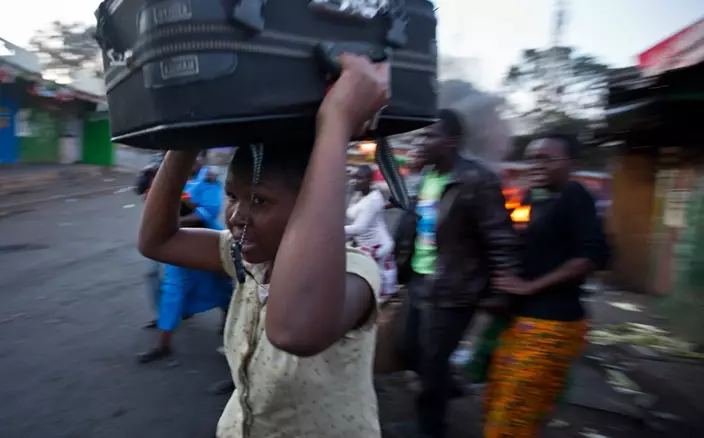
Passers by run for safety during clashes between opposition supporters and police which erupted after the election commission announced results from the Oct. 26 vote, in the Kibera area of Nairobi, Kenya, Monday, Oct. 30, 2017.(AP Photo/Darko Bandic)
Most of Kenya has been peaceful during the political standoff that has transfixed the nation since the August election; human rights groups say dozens of people were killed by police in unrest following the earlier vote.
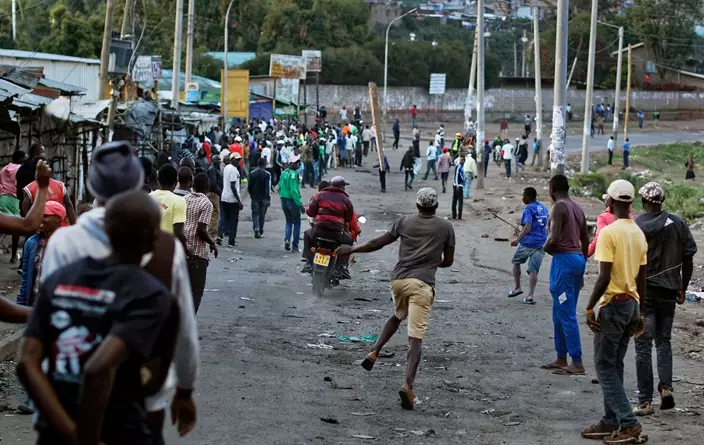
An opposition protester throws a stick as he tries to attack a man fleeing by motorcycle taxi, as clashes erupted between protesters and police after the election result was announced, in the Mathare slum of Nairobi, Kenya Monday, Oct. 30, 2017. (AP Photo/Ben Curtis)
U.S. Ambassador Robert F. Godec said Washington is deeply concerned by the recent violence and urged Kenyans to engage in dialogue "to resolve the deep divisions that the electoral process has exacerbated."
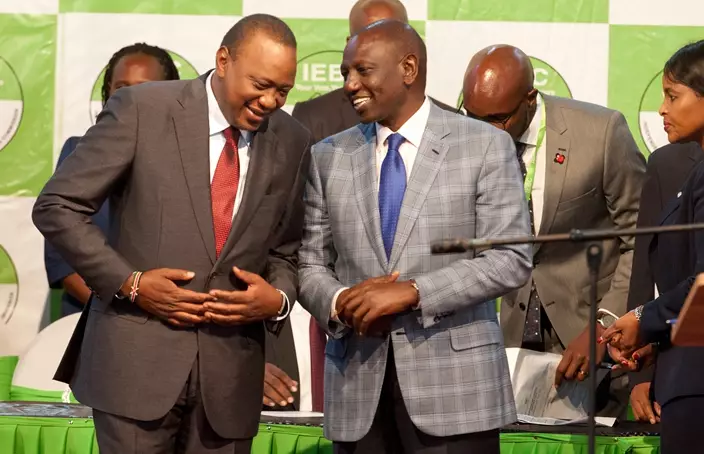
Uhuru Kenyatta, left, and William Ruto, right chat after they were announced the winners in the rerun of presidential race at the Centre in Bomas, Nairobi, Kenya, Monday, Oct. 30, 2017. The commission said Kenyatta won election with 98.2 percent of the votes (AP Photo/ Sayyid Abdul Azim)
Amnesty International alleged that police used "unlawful force" against opposition supporters and bystanders after the rerun election. The human rights group cited cases of "police brutality" as well as violence and intimidation by backers of both candidates.
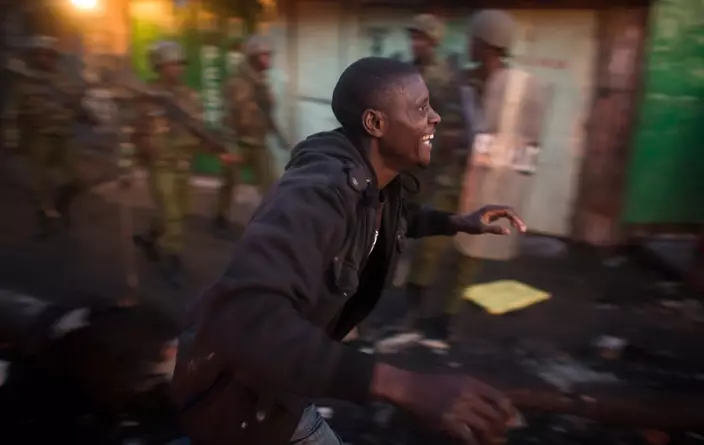
A passer by runs for safety during clashes between opposition supporters and police which erupted after the election commission announced results from the Oct. 26 vote, in the Kibera area of Nairobi, Kenya, Monday, Oct. 30, 2017. (AP Photo/Darko Bandic)
In his victory speech, Kenyatta appealed for unity. Standing at a podium, he drew laughter with a reference to his speech after his August election win.
"I've been here before," he said. "Hopefully, this is for the last time."
LONDON (AP) — Thousands of trans rights protesters gathered in central London on Saturday, days after the U.K.'s Supreme Court ruled that a woman is someone born biologically female and that transgender women are excluded from that legal definition.
With unease growing over what the ruling means for the rights of transgender people, protesters came together for what was billed as an “emergency demonstration” in Parliament Square. Activists demanded “trans liberation” and “trans rights now,” with some waving flags and holding banners.
Trans groups are worried that Wednesday's landmark decision would undermine their rights, even though the U.K.'s highest court said transgender people remain protected from discrimination. The head of Equality and Human Rights Commission said the ruling will mean transgender women will be excluded from women’s toilets, hospital wards and sports teams.
“It’s a terrifying time to have your rights taken away from you," said 19-year-old transgender woman Sophie Gibbs. “I was disappointed to think that we could live in a society that seems so progressive now but is willing to make such a dangerous and harmful ruling.”
The British government has said the unanimous decision by the five judges brought “clarity and confidence” for women and service providers.
Out of some 66 million people in England, Scotland and Wales, about 116,000 identified as trans in the latest census count. About 8,500 gender recognition certificates have been issued.
The ruling stemmed from a 2018 law passed by the Scottish Parliament that required at least 50% women on boards of Scottish public bodies. Transgender women with gender recognition certificates were to be included in meeting the quota.
The Supreme Court said that using a certificate to interpret someone’s sex would clash with definitions of man and woman and, therefore, the anti-discrimination provisions of the 2010 Equality Act could “only be interpreted as referring to biological sex.”
Scotland’s First Minister John Swinney said Saturday that he “understands” the “hurt and anguish” trans people are feeling over the verdict, while accepting that the ruling must be followed.
Many people at Saturday's protest worried that the ruling could be the precursor to other judgments that diminish the rights for transgender people.
“It’s a Pandora’s box situation where I just think we allow certain things and then we essentially opened up the door to allow way more than we ever thought could be accepted or pushed through," said Zuleha Oshodi, 29.
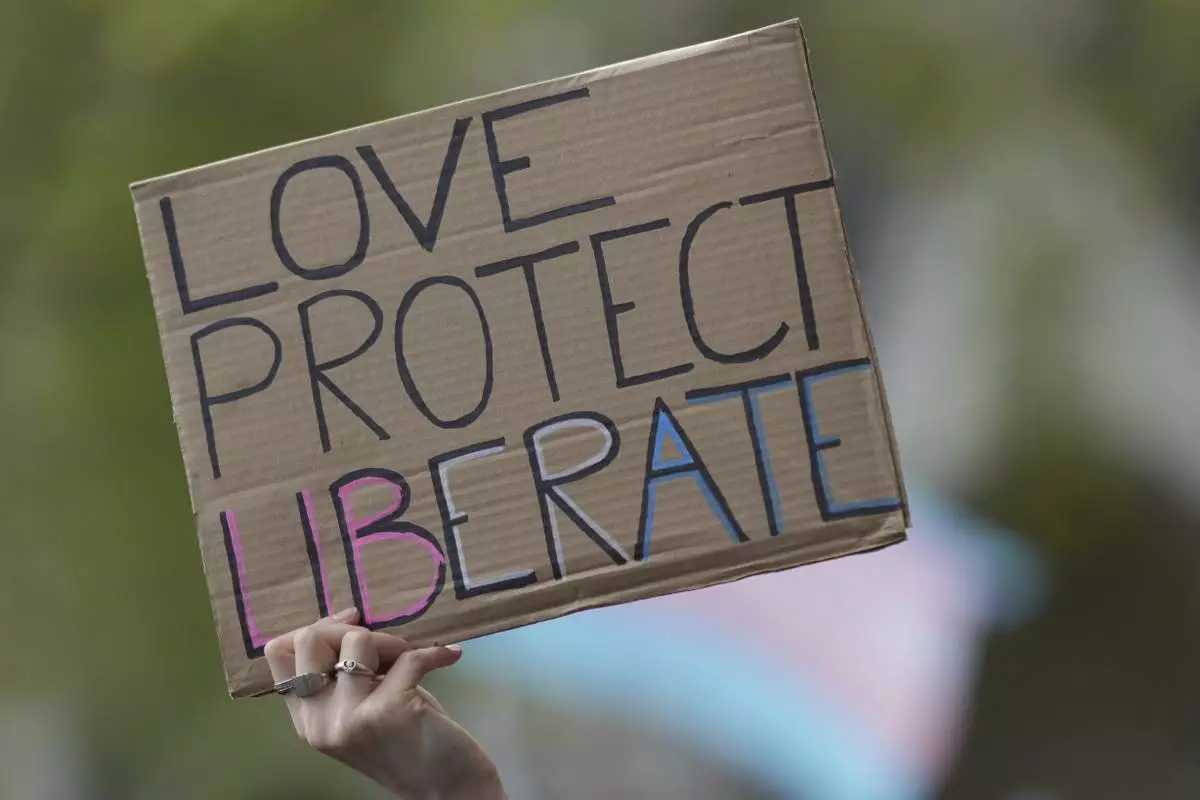
Campaigners take part in a rally organised by trans rights groups, trade unions, and community organisations following the Supreme Court ruling on the definition of a woman in equalities law, at Parliament Square, central London, Saturday April 19, 2025. (AP Photo/Alastair Grant)
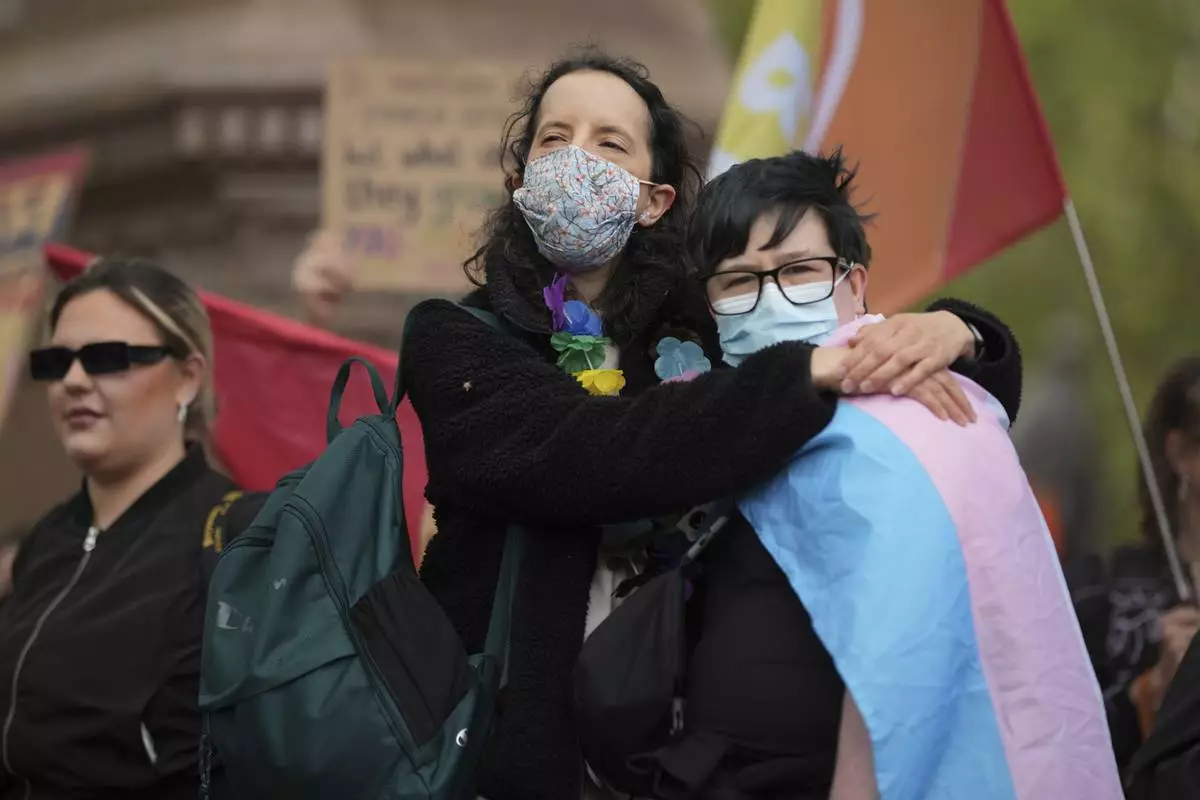
A couple hug as they take part in a rally organised by trans rights groups, trade unions, and community organisations following the Supreme Court ruling on the definition of a woman in equalities law, at Parliament Square, central London, Saturday April 19, 2025. (AP Photo/Alastair Grant)
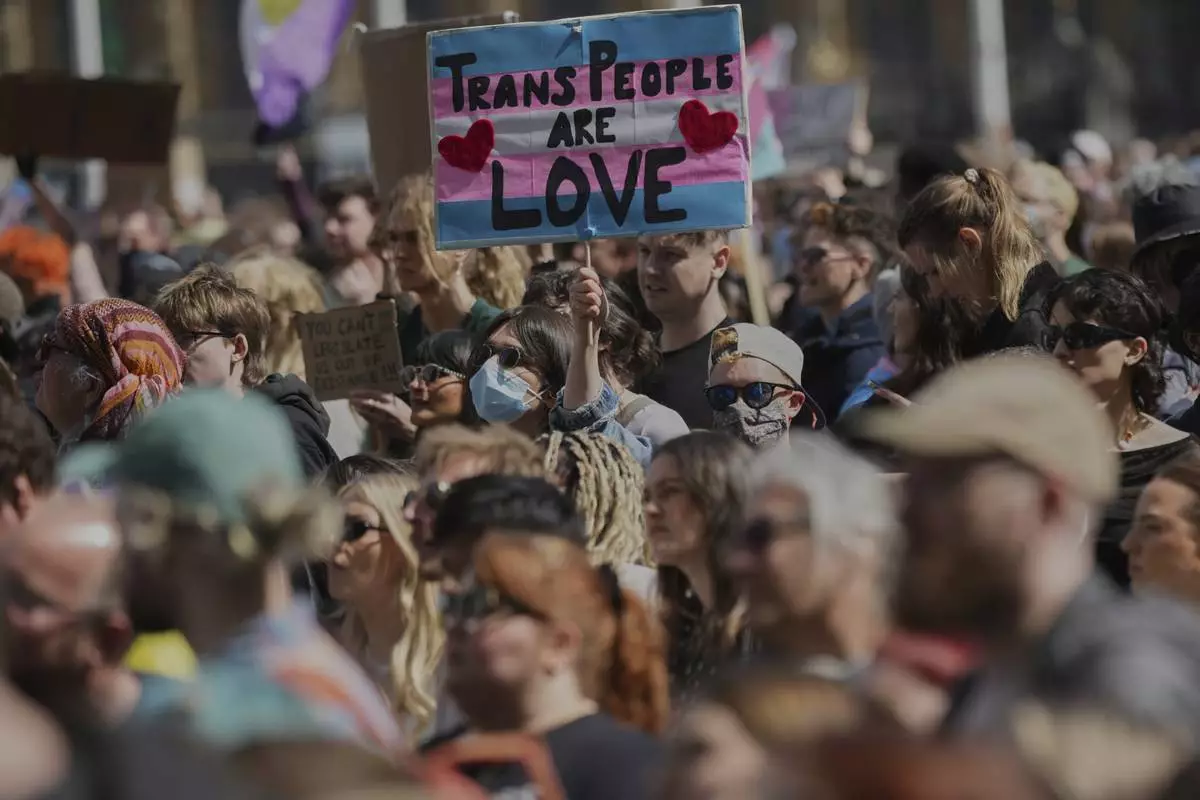
Campaigners take part in a rally organised by trans rights groups, trade unions, and community organisations following the Supreme Court ruling on the definition of a woman in equalities law, at Parliament Square, central London, Saturday April 19, 2025. (AP Photo/Alastair Grant)
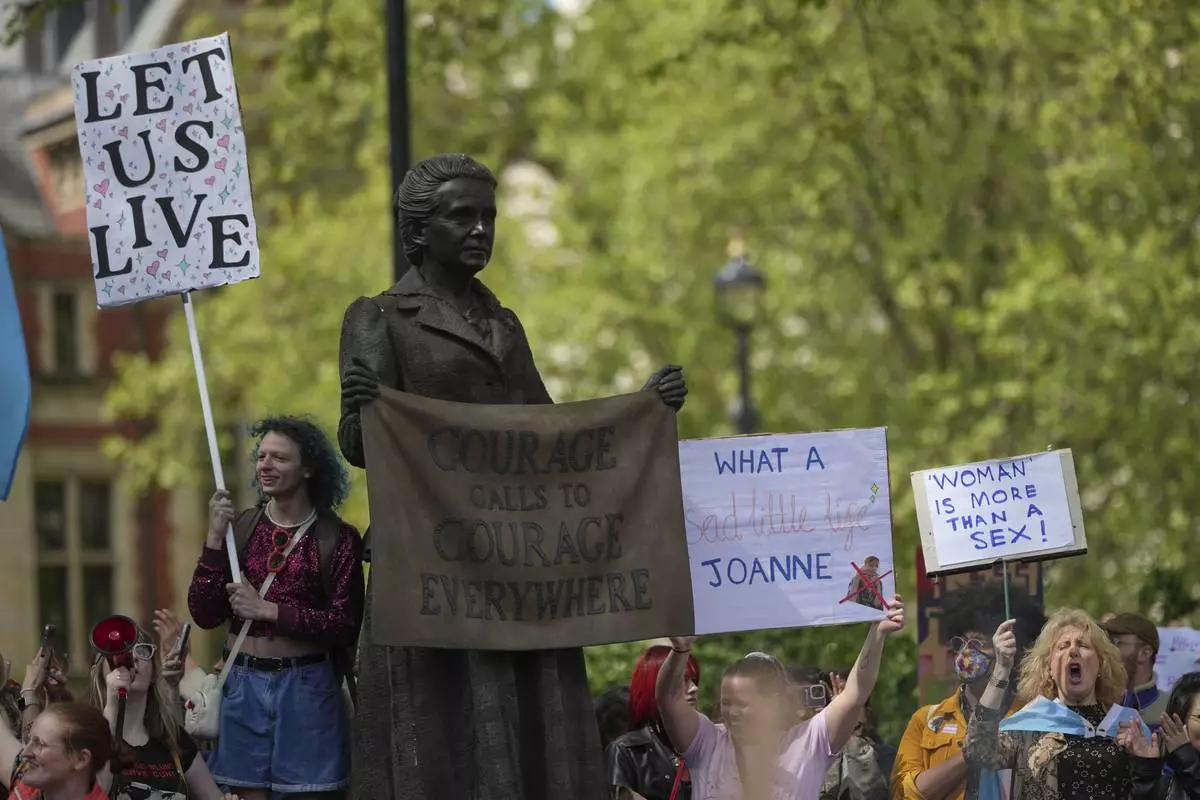
Campaigners take part in a rally organised by trans rights groups, trade unions, and community organisations following the Supreme Court ruling on the definition of a woman in equalities law, at Parliament Square, central London, Saturday April 19, 2025. (AP Photo/Alastair Grant)
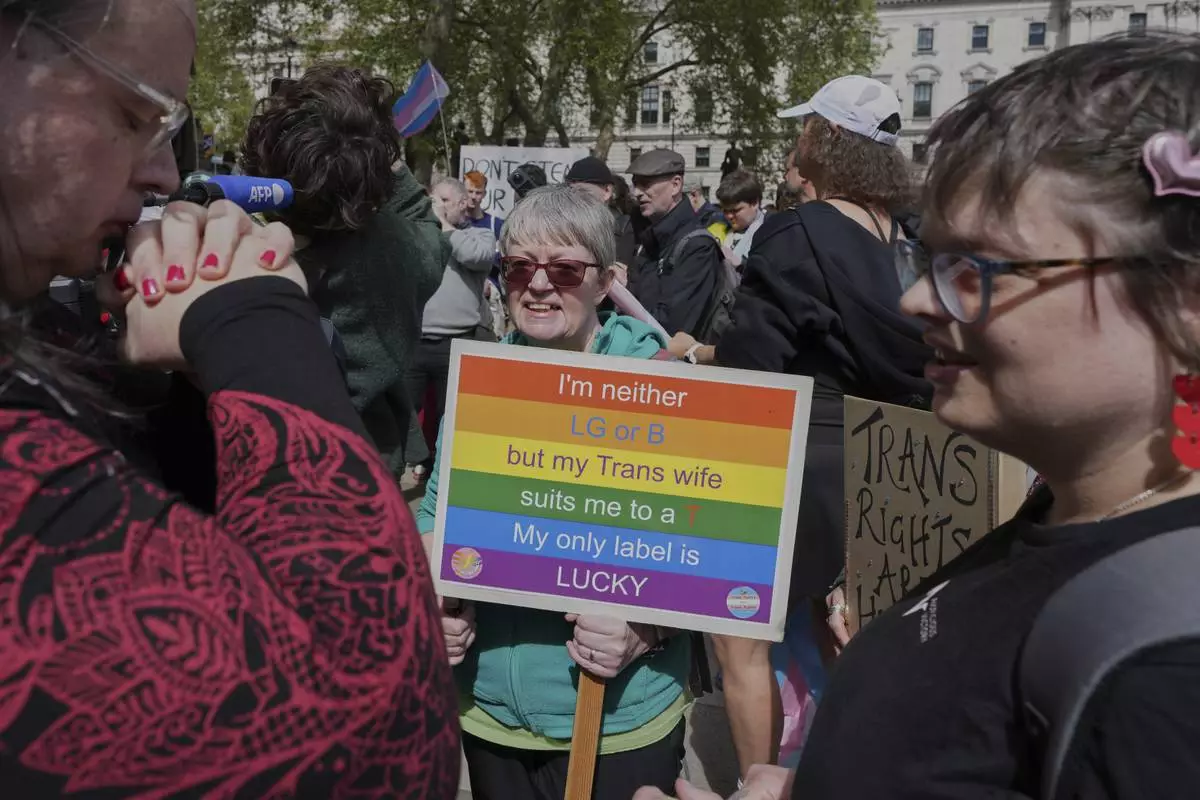
Campaigners take part in a rally organised by trans rights groups, trade unions, and community organisations following the Supreme Court ruling on the definition of a woman in equalities law, at Parliament Square, central London, Saturday April 19, 2025. (AP Photo/Alastair Grant)
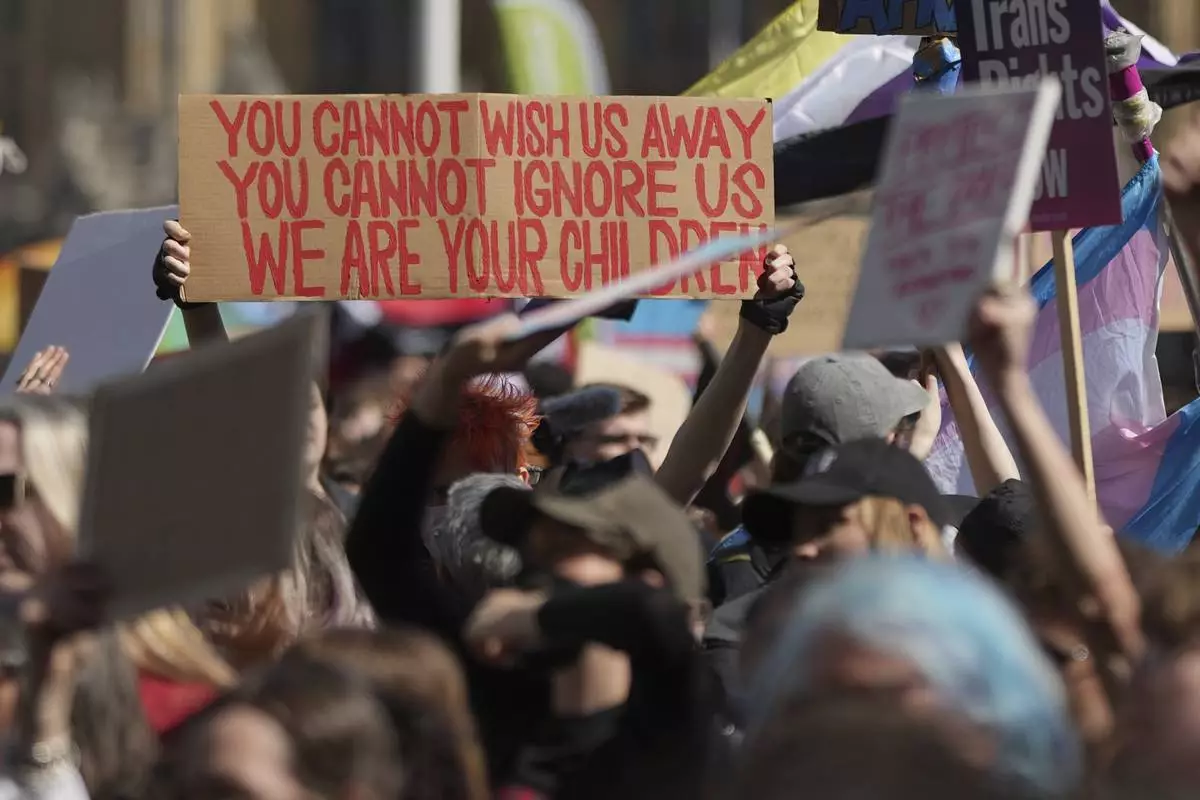
Campaigners take part in a rally organised by trans rights groups, trade unions, and community organisations following the Supreme Court ruling on the definition of a woman in equalities law, at Parliament Square, central London, Saturday April 19, 2025. (AP Photo/Alastair Grant)
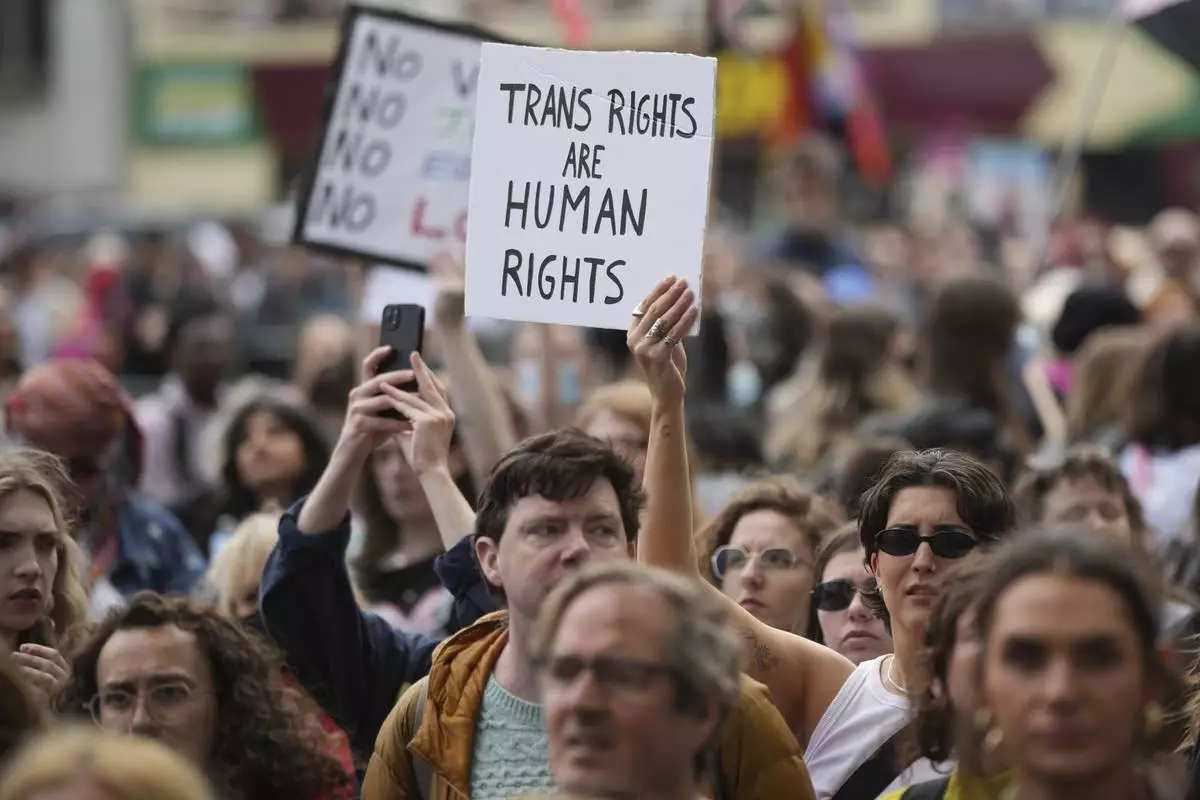
Campaigners take part in a rally organised by trans rights groups, trade unions, and community organisations following the Supreme Court ruling on the definition of a woman in equalities law, at Parliament Square, central London, Saturday April 19, 2025. (AP Photo/Alastair Grant)
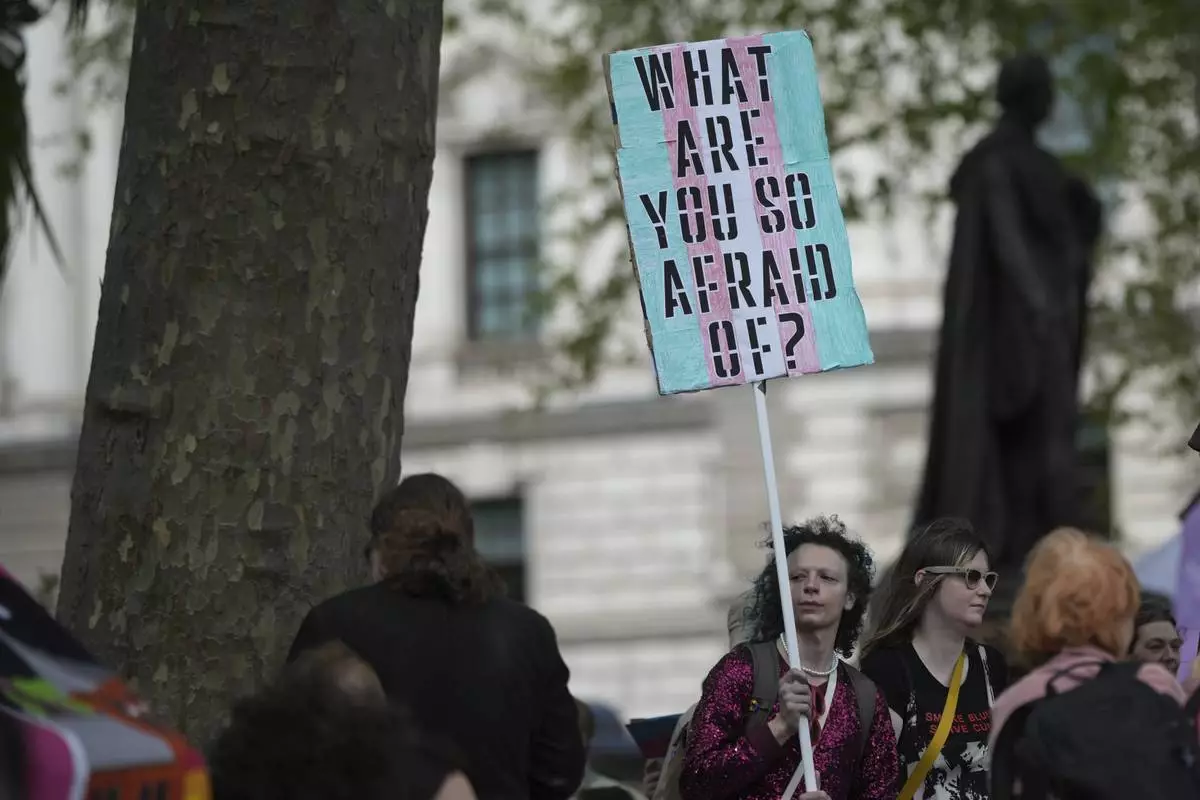
Campaigners take part in a rally organised by trans rights groups, trade unions, and community organisations following the Supreme Court ruling on the definition of a woman in equalities law, at Parliament Square, central London, Saturday April 19, 2025. (AP Photo/Alastair Grant)
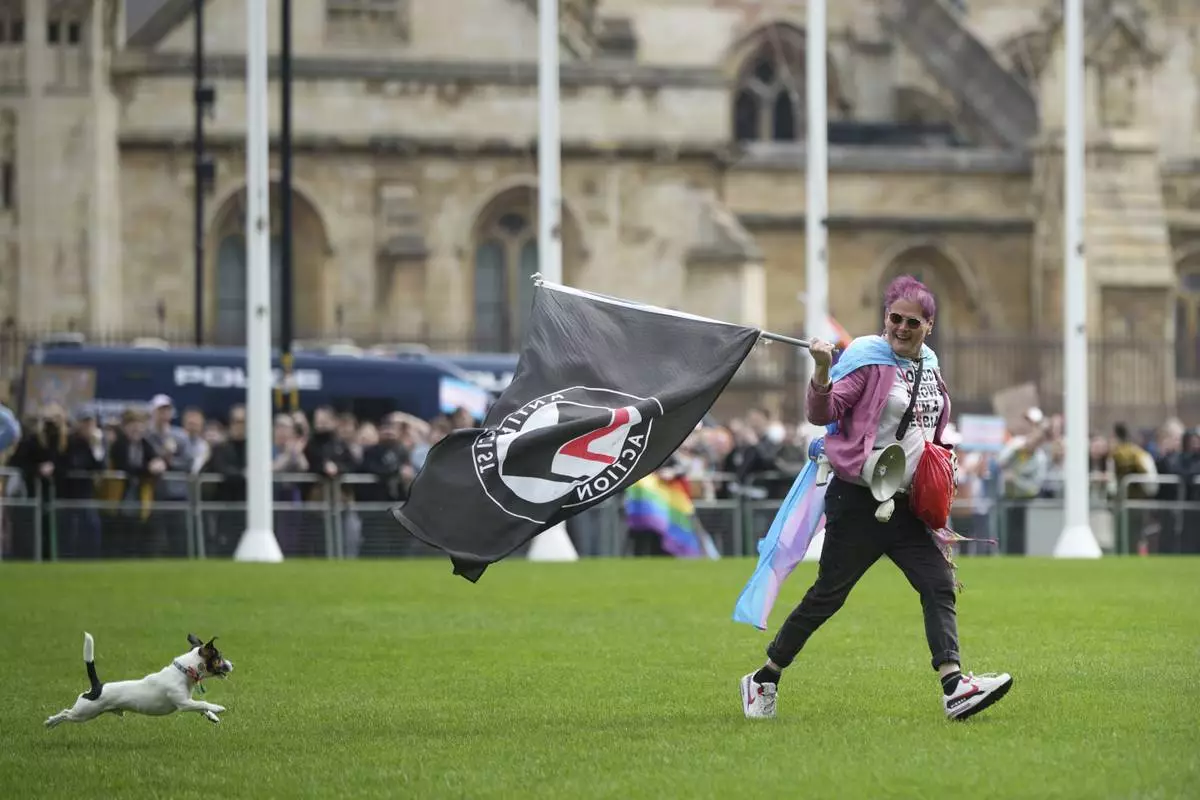
A person with a dog runs across Parliament Square as they take part in a rally organised by trans rights groups, trade unions, and community organisations following the Supreme Court ruling on the definition of a woman in equalities law, at Parliament Square, central London, Saturday April 19, 2025. (AP Photo/Alastair Grant)
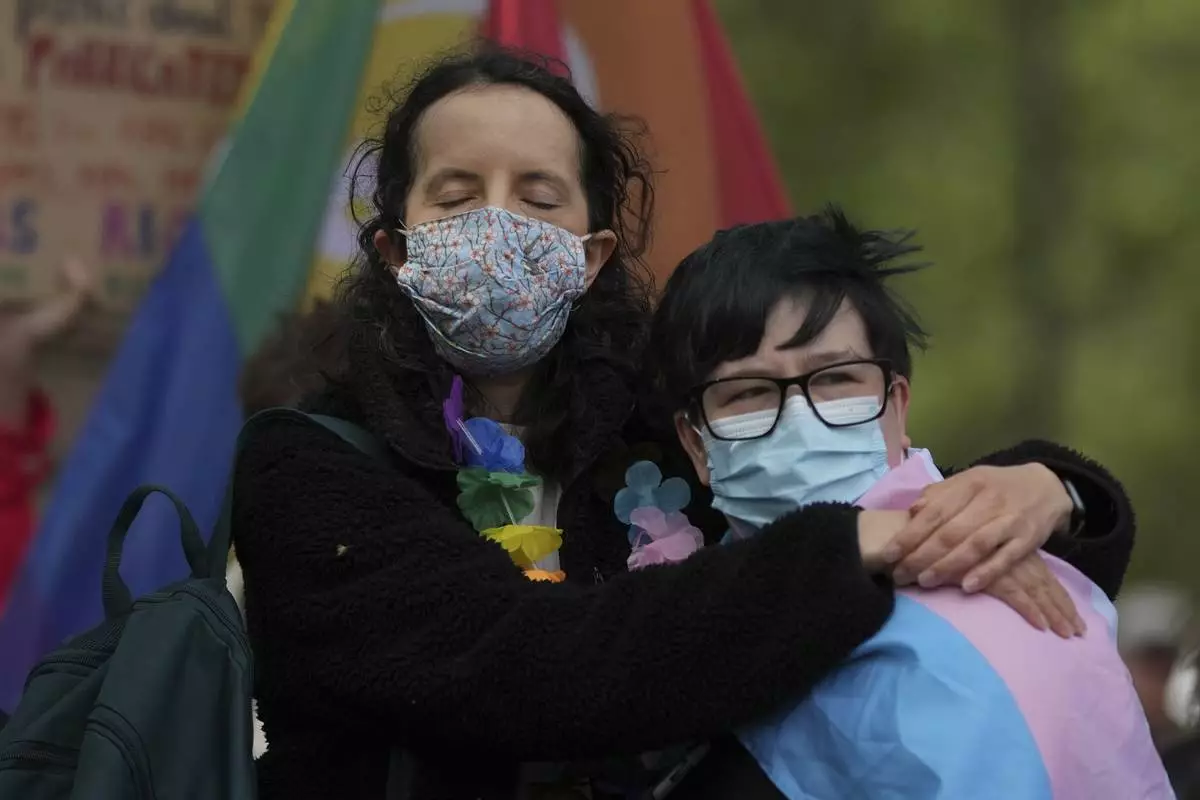
Campaigners take part in a rally organised by trans rights groups, trade unions, and community organisations following the Supreme Court ruling on the definition of a woman in equalities law, at Parliament Square, central London, Saturday April 19, 2025. (AP Photo/Alastair Grant)
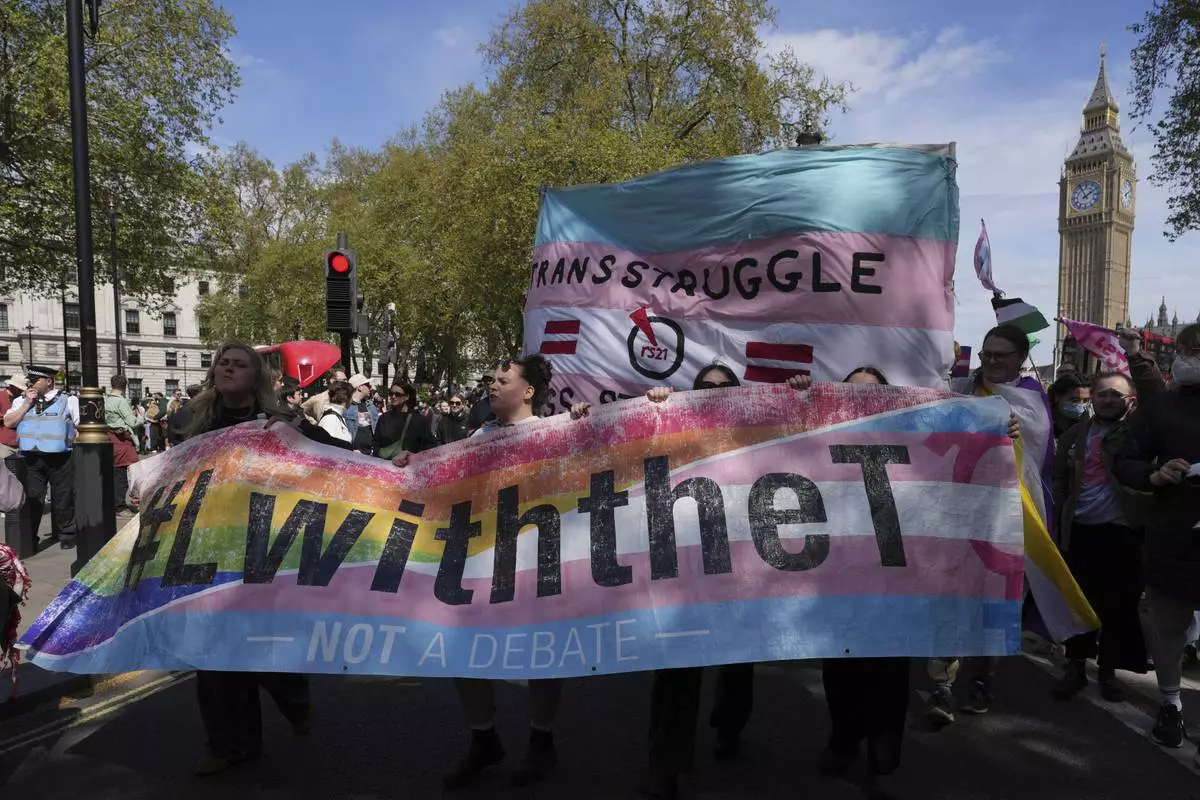
Campaigners take part in a rally organised by trans rights groups, trade unions, and community organisations following the Supreme Court ruling on the definition of a woman in equalities law, at Parliament Square, central London, Saturday April 19, 2025. (AP Photo/Alastair Grant)
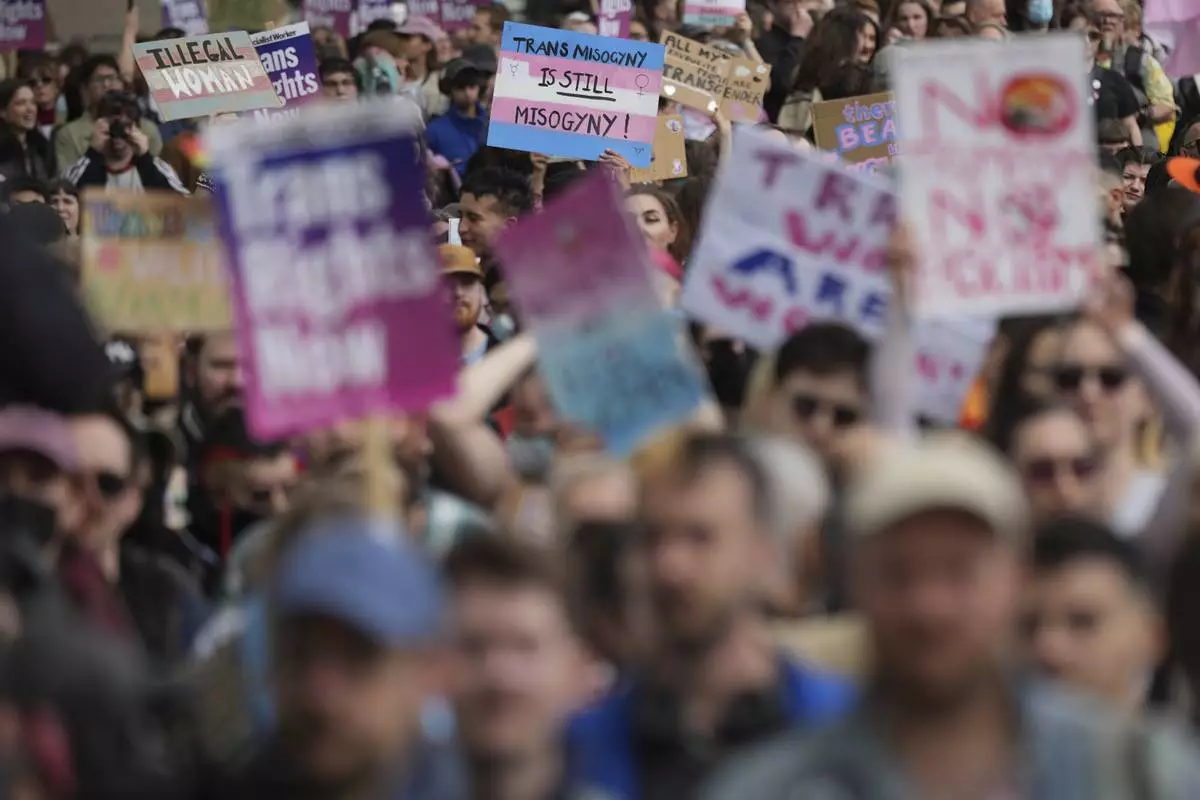
Campaigners take part in a rally organised by trans rights groups, trade unions, and community organisations following the Supreme Court ruling on the definition of a woman in equalities law, at Parliament Square, central London, Saturday April 19, 2025. (AP Photo/Alastair Grant)
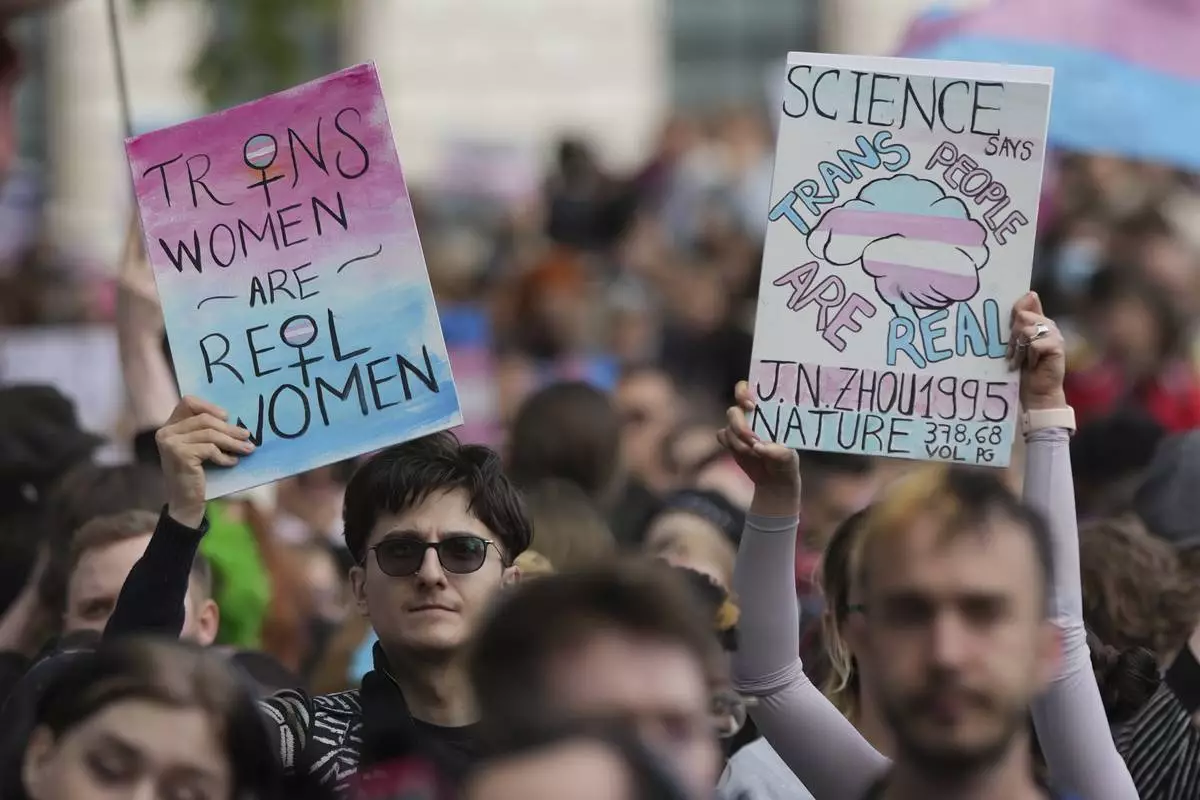
Campaigners take part in a rally organised by trans rights groups, trade unions, and community organisations following the Supreme Court ruling on the definition of a woman in equalities law, at Parliament Square, central London, Saturday April 19, 2025. (AP Photo/Alastair Grant)
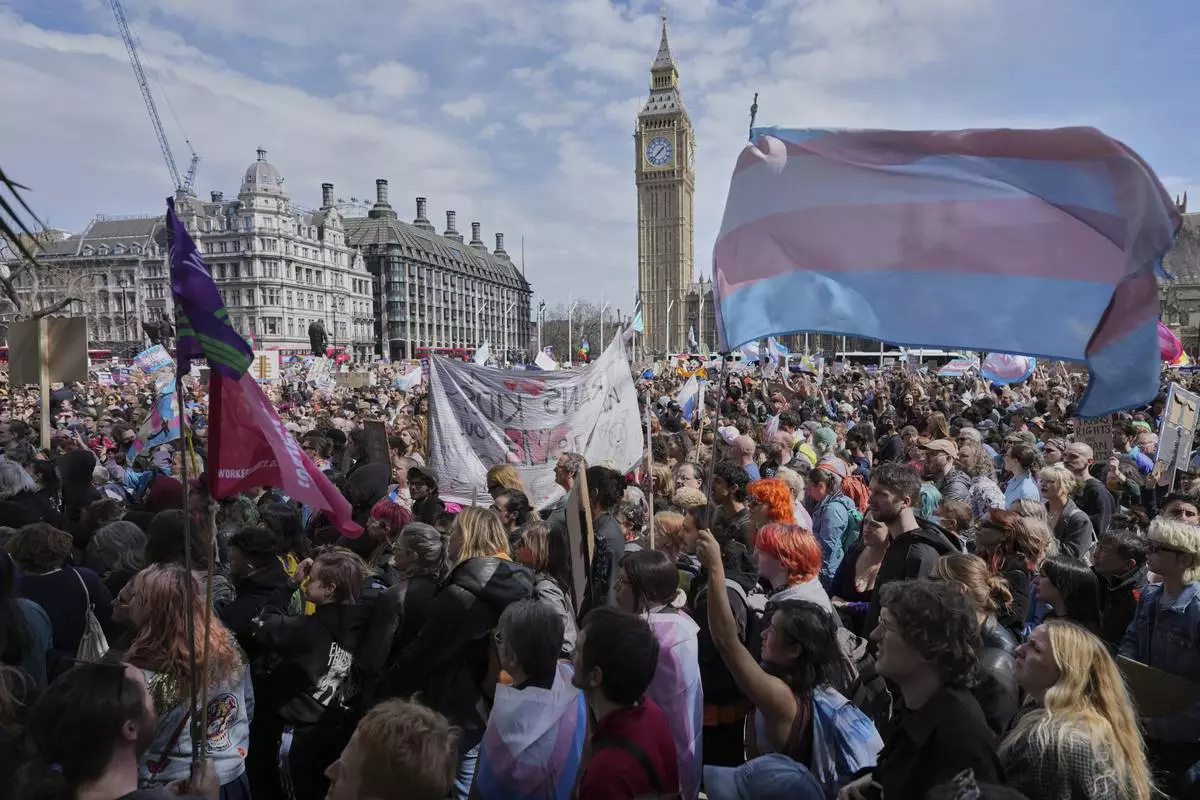
Campaigners take part in a rally organised by trans rights groups, trade unions, and community organisations following the Supreme Court ruling on the definition of a woman in equalities law, at Parliament Square, central London, Saturday April 19, 2025. (AP Photo/Alastair Grant)




































